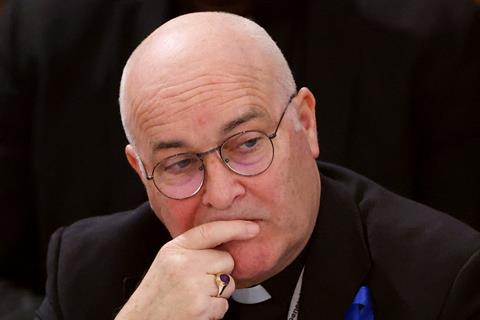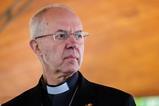Newcastle Cathedral has cancelled a planned speaking appearance by the Archbishop of York Stephen Cottrell, citing concerns over his handling of safeguarding. Rev Dr Christopher Landau argues that instead of resorting to worldly tactics of de-platforming, the Cathedral should heed the New Testament’s radical call for love and unity

These are not normal times for the Church of England.
The resignation of the Archbishop of Canterbury last November was unprecedented. Disproportionately ageing congregations, ongoing divisions over sexuality, and the shame and chaos of its handling of safeguarding, all point to an institution facing profound, even existential challenges.
And now, there is a rash of examples of various kinds of disinvitation or de-platforming which, I fear, only risk deepening the wounds which already exist.
The latest example involves the decision of the Dean and Chapter of Newcastle Cathedral to revoke an invitation to the Archbishop of York.
The Archbishop in question - the Most Rev Stephen Cottrell - is an evangelist at heart, and over the coming months is touring the cathedrals of the north of England to share insights about the Lord’s Prayer. It is hardly a contentious initiative. And yet Newcastle Cathedral has decided to de-platform the Archbishop, cancelling his planned appearance in September over his handling of safeguarding.
In a statement to the Church Times, the Dean of Newcastle, the Very Revd Lee Batson, said that he was “deeply proud of the Cathedral’s ongoing ministry to those who have suffered abuse in their lives…It was this that informed the unanimous decision made solely by the Dean and Chapter to inform the Archbishop that we will not be hosting him as part of his Lord’s Prayer tour.”
My concern is what this decision says about both the unity of the church, and the way in which we face our inevitable disagreements and divisions. Are we, to quote Ephesians 4:3, attempting to “make every effort to keep the unity of the Spirit through the bond of peace”? Or are we simply following a current worldly fashion for de-platforming those with whom we disagree?
In the Newcastle case, the stated concern is about the treatment of survivors of abuse. There is no doubt that many have suffered terribly, even to their deaths, as a result of the church’s failures over safeguarding. But is deplatforming really the best way to show support for survivors? Or do we risk cutting off our ecclesial nose to spite our face? Could the Newcastle invitation have been adapted so that, for example, the Archbishop was invited to meet survivors as part of his visit? Or might he have been asked specifically to pray for survivors as part of an evensong service?
Division
This is by no means the only current example where divided clergy seem to prefer to make a political statement from a distance, thus fostering division, rather than seeking to engage fruitfully in person. The Bishop of Southwark recently informed his diocesan synod about the scale of division he is encountering: “some clergy of this Diocese wrote to me not only to reaffirm their withdrawal from praying with Deanery colleagues but also to say that they would now no longer even eat with them.”
Meanwhile the Church of England Evangelical Council (CEEC) has announced alternative services to those which ordinarily invite all the licensed ministers of a diocese to renew their vows together in Holy Week. The Revd John Dunnett, CEEC’s National Director, wrote, “we know that many clergy across the country feel in good conscience unable to attend the traditional Chrism Mass service in their diocese. So we are offering two alternative services, in keeping with the Alliance’s construction of the de facto parallel province.”
In other words, he risks prioritising the establishment of alternative structures (which draw clergy away from one another) over the slow, costly, patient work of seeking mutual understanding – and, ultimately, the unity which is such a precious and overlooked gift in the Christian life.
Love
The penitential season of Lent is a good time to reflect on our own part in inflicting wounds to the Body of Christ – the church.
In a few weeks’ time, many cathedrals and other churches will hold services on Maundy Thursday that commemorate the Last Supper, and include an act of footwashing. I actually believe that footwashing is a chronically under-used Christian practice – after all, in John’s gospel, Jesus did say to his disciples, “Now that I, your Lord and Teacher, have washed your feet, you also should wash one another’s feet.” (John 13:14).
Jesus notably didn’t ‘deplatform’ even his betrayer
And, famously, that same occasion includes Jesus reminding his followers that it is their mutual love which makes them recognisable as his disciples: “By this everyone will know that you are my disciples, if you love one another”. Remarkably, both Peter and Judas were included in the footwashing - Jesus notably didn’t ‘deplatform’ even his betrayer.
In a fractious and divided Lent in our national church, it is self-evident that English Anglicans have some journey yet to travel, when it comes to the visibility of our mutual love.
But if that love is as crucial to mission as Jesus suggests, it is a love that needs restoring in the shared Christian life. It is a love that might even prompt us to share a platform with an archbishop with whom we profoundly disagree.





































2 Readers' comments